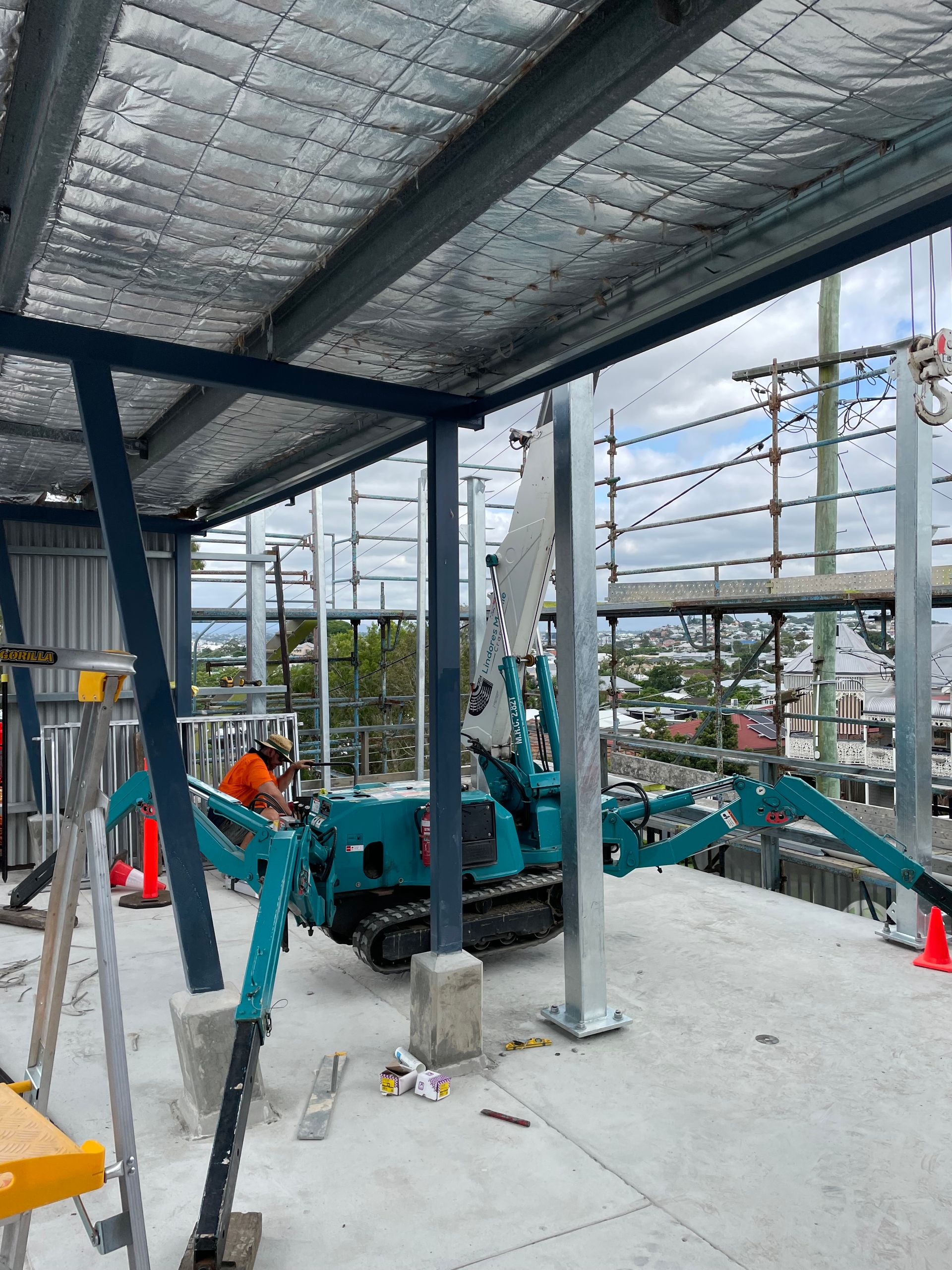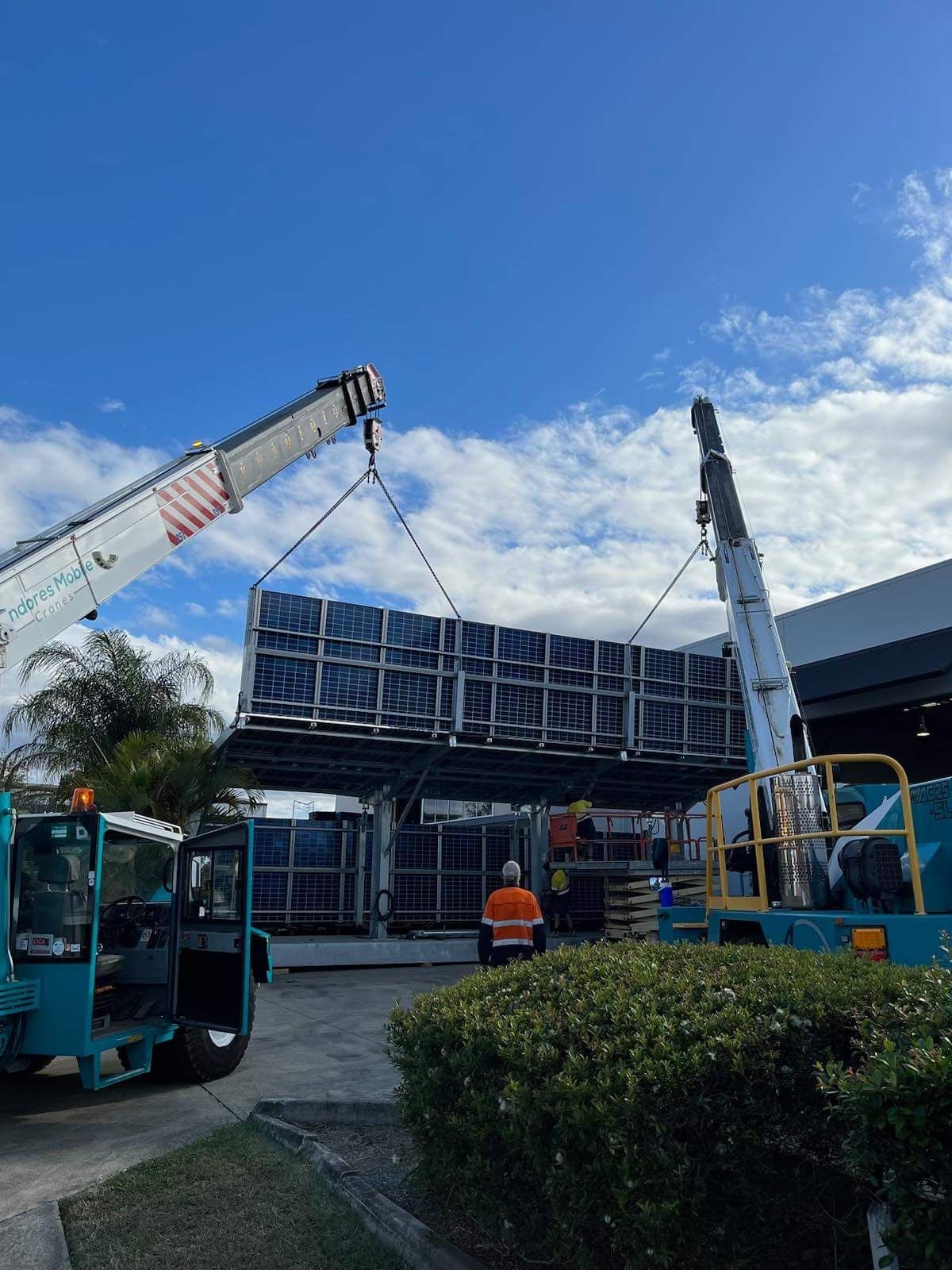Elevating Landscapes: The Crucial Role of Mobile Cranes in Australia's Landscaping Industry

Our mobile cranes have come into hot demand for the Landscaping industry. Whether it’s earth moving, plant instalment or even putting in a pool, mobile cranes are the perfect tool to turn to. Lindores Mobile Cranes
have a huge variety of mobile cranes for landscapers to choose from.
In this blog, we will explore the indispensable role and importance of mobile cranes in the Australian landscaping industry.
Site Preparation and Earthmoving
Landscaping projects often involve significant earthmoving activities to shape the terrain and create the desired topography. Mobile cranes play a crucial role in transporting heavy machinery and materials to the site, ensuring efficient site preparation. From excavators to bulldozers, mobile cranes facilitate the seamless movement of these heavy pieces of equipment, enabling landscaping professionals to mould the land according to their vision.
Tree Transplanting and Installation
Trees are integral to any landscape design, providing shade, aesthetics, and ecological benefits. However, the process of transplanting mature trees or installing new ones can be a challenging task. Mobile cranes equipped with specialized attachments make it possible to lift and position large trees with precision, minimizing the impact on their root systems. This capability is essential for preserving the health of the trees and ensuring their successful integration into the landscape.
Hardscape Construction
Hardscape elements, such as retaining walls, fountains, and sculptures, add structure and character to outdoor spaces. The installation of these features often requires heavy lifting and precise placement. Mobile cranes, with their versatility and lifting capacity, enable landscapers to effortlessly position these elements, ensuring that the hardscape components seamlessly integrate into the overall design.
Efficient Material Handling
Landscaping projects involve a variety of materials, from large rocks and boulders to pavers and decorative stones. Mobile cranes simplify the process of material handling, reducing the manual labour required and expediting project timelines. The ability to lift and transport bulk materials efficiently enhances the overall productivity of landscaping teams, allowing them to focus on the creative aspects of their work.
Streamlining Project Timeline
Time is of the essence in the landscaping industry, and delays can impact project schedules and budgets. Mobile cranes contribute to streamlined project timelines by expediting critical tasks such as equipment mobilization, tree installation, and material handling. The efficiency and speed offered by mobile cranes enable landscaping professionals to meet deadlines and deliver high-quality results to their clients.
Conclusion
In the dynamic world of landscaping, mobile cranes emerge as indispensable tools that elevate the industry to new heights—both literally and figuratively! From the initial stages of site preparation to the final touches of hardscape installation, these versatile machines play a pivotal role in shaping the outdoor spaces that define the Australian landscape. As the landscaping industry continues to evolve, the importance of mobile cranes will only grow, ensuring that the vision of landscape architects and designers becomes a tangible reality across the diverse terrains of Australia.
If you’re planning some backyard renos, or need a crane to level up your landscaping projects, give us a call!
You can catch us on (07) 33760611 or head to our website to see our full range!
The Liftout

By JADE LINDORES
•
10 May, 2024
Can you imagine trying to undertake a commercial or residential project without a crane? That sounds like our biggest nightmare! Today, we’re taking a look back at how this crane story all started. The use of cranes in Australia continues to evolve, as our construction technology improves, and urban areas expand. Early history In the late 1800s, cranes were essential for handling cargo in Australia's bustling ports and harbors. These robust machines facilitated the loading and unloading of goods from ships, enabling efficient trade and commerce across the continent. From wool and grain to minerals and manufactured goods, cranes played a vital role in the transportation and distribution of Australia's diverse exports and imports, supporting the growth of its economy and international trade networks. In the 19th century, cranes dominated skylines as they facilitated the erection of towering buildings and bridges, emblematic of urban growth and modernization in Sydney and Melbourne. Moreover, in remote regions, cranes played a crucial role in the development of mining operations, aiding in the extraction and transportation of valuable resources such as coal, gold, and iron ore. Post-World War II expansion From the 1940s to 1960s, Australia saw a construction boom after World War II. This led to the increased usage of cranes in both commercial and residential projects. This period marked the increase of high-rise construction in major cities. Technological advancements and the rise of Lindores Mobile Cranes From the 1970s onwards, the introduction of tower cranes revolutionised the construction industry in Australia. These cranes were essential for constructing taller buildings, particularly in the confined spaces of developing CBD’s. In 1985, Lindores Cranes and Rigging was founded by Peter Lindores and started trading as Total Rigging. In 1993, Chris Austin pioneered the introduction of Mini and Mobile Cranes to Southeast Queensland, with his company Mini Cranes Queensland. Recent developments From the 2000s onwards there has been significant advancements in crane technology, including the more-widespread adoption of Mobile and Crawler cranes that offer versatility and efficiency. In 2007, Mini Cranes Queensland was passed on to the Lindores family. We officially changed the name of Queensland Mini Cranes to Lindores Mobile Cranes in 2015. Throughout this time, Lindores Mobile Cranes has continued advocacy of the use of Mobile cranes in construction, industry, and manufacturing throughout Queensland. The future The current trend in the crane industry includes integrating digital technologies for better load management, real-time monitoring, and predictive maintenance. Automation and remote operation of cranes are becoming more prevalent, aiming to increase safety and efficiency. To get Lindores Mobile Cranes on your next job, give us a call on 📞 07 3376 0611.

By JADE LINDORES
•
14 Apr, 2024
Gaining rooftop access can be a critical aspect of construction and maintenance, particularly in urban environments. Cranes, with their lifting capabilities and reach, offer a viable solution for transporting materials, equipment, and personnel to rooftops. While the process of using a crane for these operations can be complex, Lindores Mobiles Cranes has you covered. We take control of the careful planning, coordination, and adherence to safety protocols, in order to efficiently access any rooftop using our range of suitable cranes. In this blog post we will explore the considerations, safety measures, and steps involved in accessing a rooftop using a crane. Understanding the need for crane access Accessing a rooftop using a crane is typically required in scenarios for construction and renovation, where heavy materials and prefabricated structures need lifting. As well as this, cranes can be used for maintenance and repairs, to transport tools and equipment for the job. If you’re unsure what equipment is needed for your rooftop job, contact us! Choosing the right crane It is important to pick the appropriate crane for successful rooftop access. When choosing, aspects such as lifting capacity, reach and mobility need to be considered. Our impressive fleet at Lindores Mobile Cranes can tackle just about anything, so it is important to us to give our customers the right crane for the job. Pre-operation planning A thorough plan is essential for a safe and efficient operation. A site assessment should be done to evaluate the site’s obstacles, ground conditions and space for our crane setup. When Lindores Mobile Cranes are on-site, a lift plan is conducted before use to ensure our crane is efficiently and safely completing the required rooftop operation. Safety measures Using a crane for rooftop access can be a dangerous task if the correct safety measures are not in place. Luckily for you, safety is the backbone of our operations here at Lindores Mobile Cranes. When hiring one of our many cranes, we ensure a qualified crane operator is on-site to complete your task. We implement stringent safety protocols so that all jobs, including rooftops, are conducted carefully and efficiently. If you are need a hand accessing a rooftop, or any other hard-to-reach spot, contact Lindores Mobile Cranes on (07) 3376 0611.

By JADE LINDORES
•
15 Mar, 2024
What do towering skyscrapers, expensive bridges and intricate infrastructure projects all have in common? In their construction, they all relied on cranes. Cranes are the unsung heroes of some of the biggest constructions projects, essential in facilitating progress, efficiency, and safety on-site. Lindores Mobile Cranes have supplied cranes to the commercial industry for decades. Today, we look in greater detail at the indispensable role of cranes in the commercial construction industry. Efficiency and Precision: Imagine trying to build a skyscraper without the aid of cranes – an unthinkable feat! Cranes are synonymous with efficiency, enabling construction teams to hoist heavy materials, manoeuvre them into precise positions, and orchestrate seamless assembly processes. Lindores Mobile Cranes, with their advanced technology and skilled operators, exemplify efficiency in action. Whether it's lifting steel beams, positioning pre-cast concrete panels, or installing mechanical components, their fleet of cranes ensures that every task is executed with precision and timeliness. Versatility and Adaptability: One of the most remarkable features of cranes is their versatility. From towering high-rise constructions to intricate infrastructure projects, cranes come in various types and sizes to suit the specific needs of each endeavour. Lindores Mobile Cranes offers a diverse range of crane solutions, with lifting capacities ranging from 2.8T to 100T. This versatility allows construction companies to tackle a wide array of projects with confidence, knowing they have the right equipment at their disposal. Safety First: Safety is paramount in the construction industry, and cranes play a crucial role in upholding these standards. With their robust design, sophisticated safety features, and experienced operators, cranes ensure that heavy lifting operations are conducted with utmost caution and adherence to protocols. Lindores Mobile Cranes prioritizes safety above all else, implementing rigorous safety measures and providing comprehensive training to their operators to mitigate risks and ensure incident-free operations. Maximizing Productivity: In the fast-paced world of commercial construction, time is of the essence. Delays can be costly and disruptive, impacting timelines and budgets. Cranes, with their ability to streamline construction processes and overcome logistical challenges, are instrumental in maximizing productivity on-site. Lindores Mobile Cranes understands the importance of efficiency and productivity, offering reliable crane services that keep projects on track and on schedule. In conclusion, the role of cranes in commercial construction cannot be overstated. From enhancing efficiency and productivity to ensuring safety and driving innovation, cranes are the backbone of modern construction projects. Lindores Mobile Cranes , with their commitment to excellence and dedication to customer satisfaction, exemplify the vital role that cranes play in shaping our built environment. As construction projects continue to push the boundaries of possibility, one thing remains certain – cranes will always be at the forefront, lifting the industry to new heights. To enquire about having Lindores Mobile Cranes on your next job, give us a call on (07) 3376 0611.
ADDRESS
17 Westcombe Street
Darra QLD 4076
